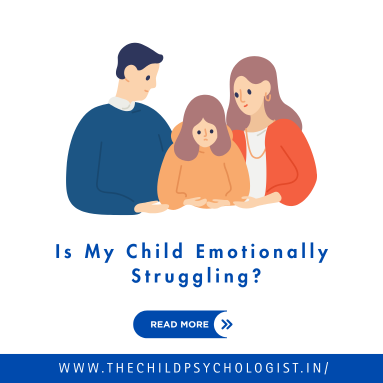15 Signs Parents Should Never Ignore (Behaviour Counselling & Child Psychology Guide)
As a parent, you may sometimes think: “My child is not the same anymore.”
Perhaps they’ve become quieter, angrier, more clingy, or have started throwing tantrums unexpectedly. Emotional struggles in children can show up in loud ways (screaming, aggression) or in silent ways (withdrawal, stomach aches, daydreaming). Sadly, these are often misunderstood as “bad behavior.”
This is why behavior counseling and professional support from a counselor therapist are so important in identifying and addressing challenges early.
15 Warning Signs Your Child May Be Emotionally Struggling
1. Frequent Meltdowns or Aggression
More than 3–4 outbursts per week, often triggered by small issues.
2. Sudden Withdrawal
Preferring isolation, avoiding conversations, or showing disinterest in friends and play.
3. Excessive Clinginess
Not wanting to attend school or separate from parents, even briefly.
4. Sleep Disturbances
Nightmares, crying at night, or difficulty falling asleep.
5. Bedwetting After Toilet Training
Especially when linked to emotional stress like a new sibling, parental conflict, or school transition.
6. Repetitive Behaviors or Tics
Rocking, nail biting, excessive blinking, or skin picking.
7. Frequent Physical Complaints Without Medical Cause
Headaches, stomachaches, or fatigue—usually before school or social situations.
8. Sudden Drop in School Performance
Struggles with focus, memory, or fear of making mistakes.
9. Regression in Behavior
Returning to baby talk, thumb sucking, or wanting to be carried.
10. Excessive Guilt or Self-Blame
Statements like “I’m stupid” or frequent over-apologizing.
11. Difficulty Expressing Emotions in Words
Saying “nothing” while clearly upset, or using actions instead of words.
12. Loss of Interest in Activities Once Enjoyed
No excitement for drawing, sports, or spending time with friends.
13. Strong Reactions to Change
Meltdowns over small transitions or inability to adapt to surprises.
14. Low Self-Esteem
Saying “I can’t do it” without trying, or comparing themselves negatively to others.
15. Outbursts at School
Reports of zoning out, crying, hitting, or refusing to participate.
Why Early Support Matters
- 1 in 5 children face emotional or behavioral challenges (WHO, 2023).
- Behaviour counselling strengthens brain development and emotional health (Harvard Center on the Developing Child).
- Early therapy prevents small struggles from becoming long-term childhood disorders.
What Parents Can Do
- Observe & Record: Track patterns, triggers, and frequency.
- Connect with Empathy: Listen without judgment and offer reassurance.
- Seek Professional Help: A counselor therapist or child psychologist can guide you in understanding whether the issue is temporary or linked to an underlying childhood disorder.
Key Takeaway for Parents
Behavior is communication.
When children cannot speak their pain, they show it through actions. If you are unsure about what’s normal and what’s not, reaching out for behaviour counselling is a sign of strength—not weakness.
Behaviour Counselling & Childhood Disorder Support in Indore
At Urjasvini Child Development Center, Indore, we provide:
- Expert behaviour counselling for children
- Therapy and assessments for childhood disorders
- Parent guidance with trusted counselor therapists
